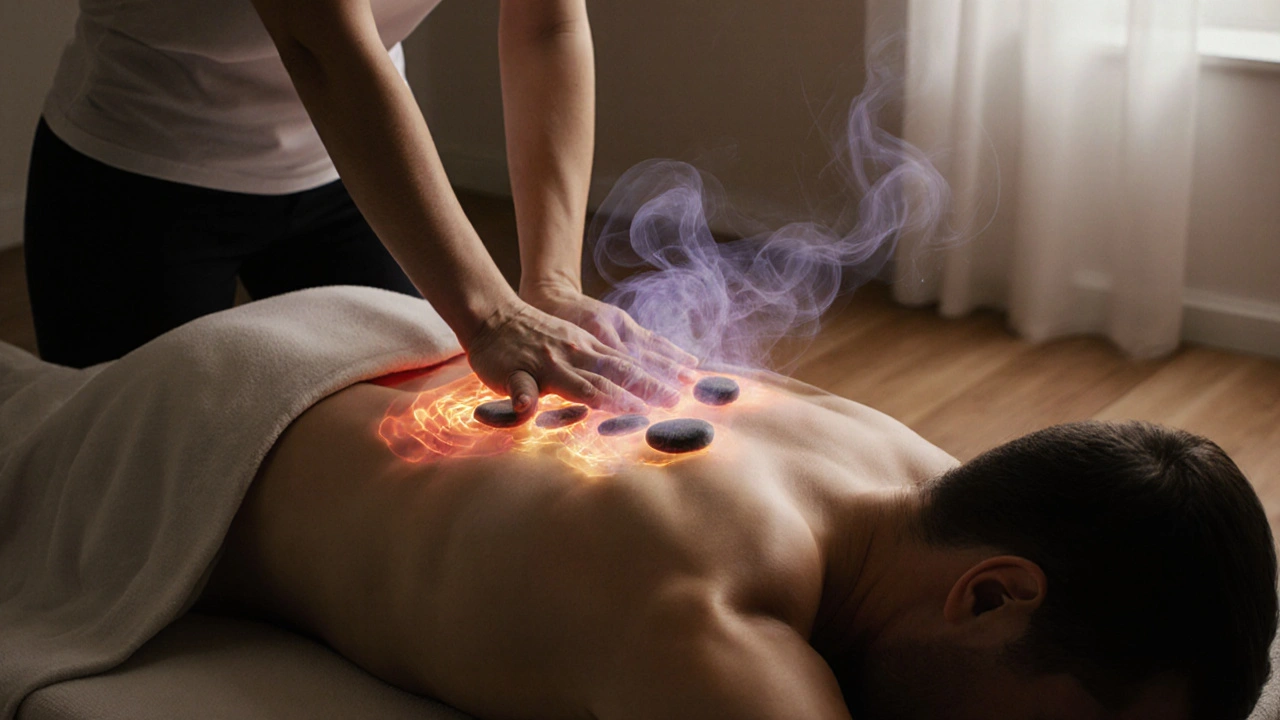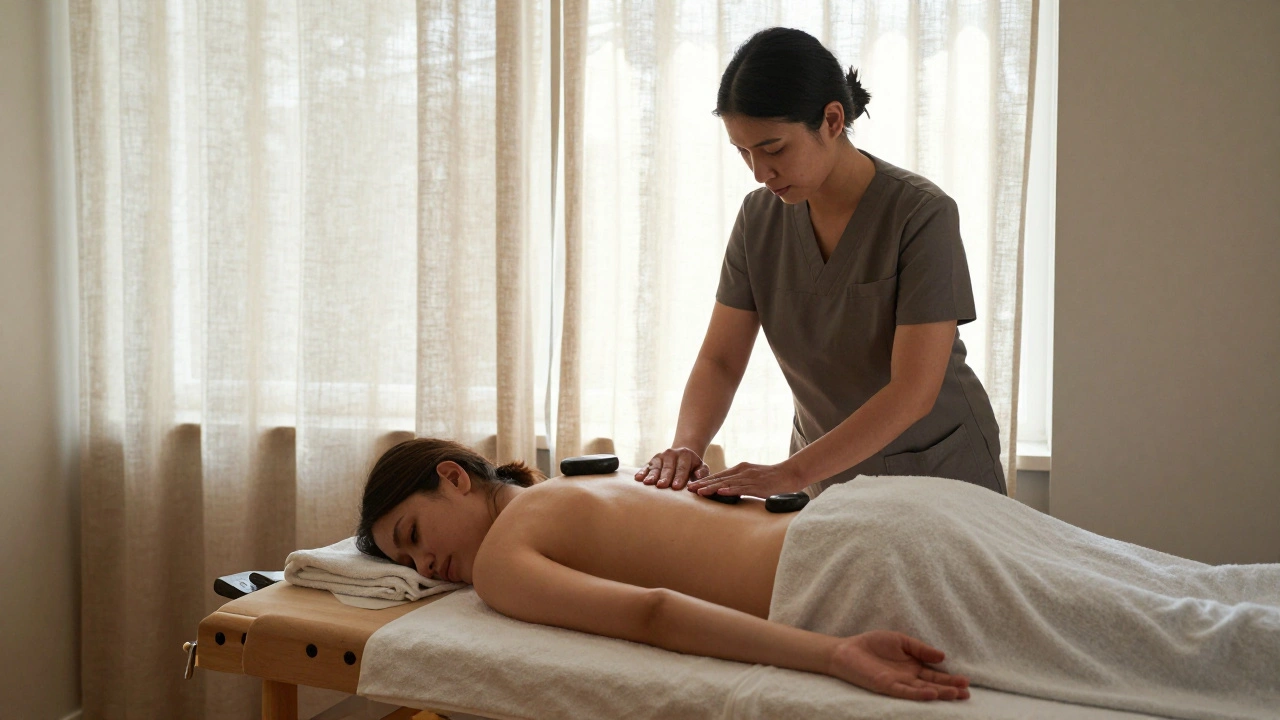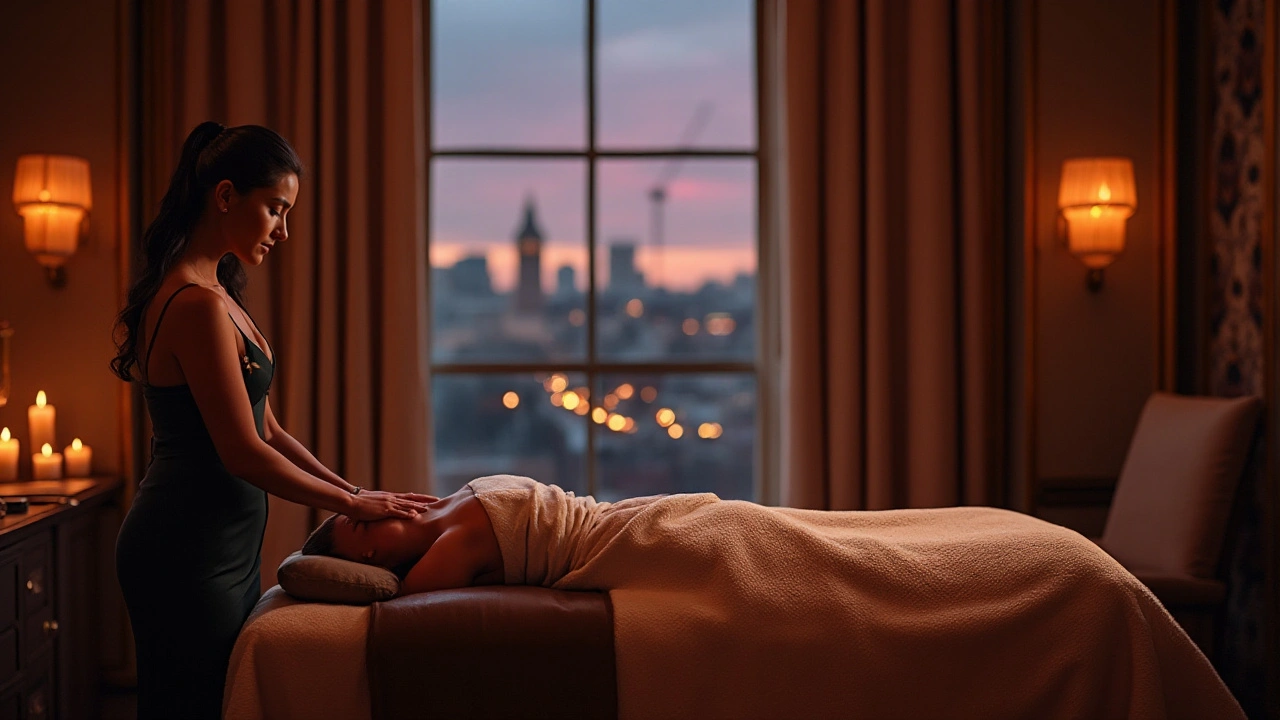Massage London: Your Gateway to Serenity in the City

London moves fast. The Tube rattles at 7 a.m., emails ping before breakfast, and meetings run late into the evening. By Wednesday, your shoulders are welded shut. Your neck feels like it’s holding up the city. You don’t need another coffee. You need touch.
Why Massage in London Isn’t a Luxury - It’s Survival
More than 70% of Londoners report chronic stress, according to a 2024 Health & Safety Executive survey. That’s not just tiredness. It’s muscle tension that won’t release, headaches that come with the commute, and sleep that feels like a distant memory. Massage isn’t about pampering. It’s about resetting your nervous system.
Think of your body like a phone running ten apps at once. Massage is the force quit button. It lowers cortisol by up to 31% in a single session, according to research from the University of Miami. That’s not a vague claim - it’s measurable. Your heart rate drops. Your breathing slows. Your jaw unclenches.
In a city where silence is rare, massage gives you a rare gift: stillness. No notifications. No rush. Just you, a warm table, and someone who knows how to unlock what your body won’t let go of.
What Kind of Massage Works Best in London?
Not all massages are made the same. And in a city this diverse, your needs matter more than trends.
Swedish massage is the classic for a reason. Long, flowing strokes. Gentle pressure. Perfect if you’re new to massage or just need to melt away the week’s tension. It’s not deep - it’s soothing. Think of it as a warm blanket for your muscles.
Deep tissue massage is for the people who’ve been carrying their laptop in their shoulders for years. It targets knots, scar tissue, and chronic tightness. It might hurt a little - but only because it’s working. A 2023 study in the Journal of Bodywork and Movement Therapies found deep tissue reduced lower back pain by 47% after six sessions.
Hot stone massage is winter magic in London. Smooth, heated basalt stones glide over your back, neck, and feet. The heat sinks deep, loosening muscles faster than hands alone. If your hands are always cold, or your lower back feels frozen, this is your go-to.
Aromatherapy massage adds essential oils. Lavender for calm. Eucalyptus to clear your head. Peppermint to wake you up gently. In a city full of exhaust fumes and fluorescent lights, scent becomes medicine.
Sports massage isn’t just for athletes. If you walk 10,000 steps a day, stand all day at your job, or carry groceries up five flights of stairs, your muscles are working hard. This massage focuses on recovery, mobility, and preventing stiffness before it turns into pain.
Where to Find Real Massage in London (Not Just a Spa Package)
Not every place calling itself a “spa” delivers real massage therapy. Some are just rooms with candles and overpriced tea. Here’s how to tell the difference:
- Look for therapists with VTCT or ITEC certifications. These are the gold-standard qualifications in the UK.
- Ask if they do initial consultations. A good therapist will ask about your pain, sleep, stress levels - not just your budget.
- Check reviews for mentions of specific techniques - “they worked on my right trapezius” or “fixed my sciatica” - not just “felt nice.”
- Avoid places that push 90-minute “relaxation packages” with no clear goal. Real therapy has purpose.
Some trusted spots in London:
- Therapy in the City (Covent Garden): Focuses on pain relief and posture correction. Most clients come back for chronic issues.
- Greenhouse Wellness (Islington): Quiet, minimalist space. Specializes in aromatherapy and Swedish massage.
- London Sports Massage Clinic (Camden): Run by former physiotherapists. Ideal if you’re sore from training, walking, or sitting too long.
Don’t feel pressured to go to a fancy location. Some of the best therapists work out of small studios in residential areas. A 60-minute session in a quiet flat in Brixton can be more healing than a luxury spa in Mayfair.

How Often Should You Get a Massage in London?
There’s no one-size-fits-all. But here’s a simple rule:
- If you’re under high stress - once every 2-3 weeks. That’s the sweet spot to prevent tension from building.
- If you have chronic pain or tightness - once a week for 4-6 weeks, then taper off.
- If you’re just curious - try one. Then decide. Most people come back after their first session.
Don’t wait until you’re in agony. Think of massage like brushing your teeth. You don’t wait for a cavity to start cleaning. Same with your muscles.
What to Expect During Your First Session
It’s normal to feel nervous. Here’s what actually happens:
- You’ll fill out a short form - medical history, areas of pain, goals.
- The therapist will ask you to undress to your comfort level. You’re covered with towels the whole time. No one sees anything they shouldn’t.
- You lie face down. They start with your back, then move to your legs, arms, neck.
- You might feel a few moments of discomfort - but it should never be sharp or unbearable. Say something if it hurts too much.
- Afterward, you’ll feel light, maybe a little sore. Drink water. Don’t jump into a meeting right away. Let your body settle.
Most people walk out feeling like they’ve been unplugged from a machine they didn’t know they were plugged into.
Massage Isn’t Just for Your Body - It’s for Your Mind
London’s pace doesn’t just tax your muscles. It taxes your mind. You’re always on. Always checking. Always preparing.
Massage forces you to stop. To breathe. To be still. In that quiet, your brain gets a chance to reset. Many clients report better sleep, fewer anxiety spikes, and even improved focus at work after just a few sessions.
This isn’t woo-woo. It’s neuroscience. Massage activates the parasympathetic nervous system - the part that says, “You’re safe. You can relax.” In a city that never turns off, that’s priceless.
Final Thought: You Deserve This
You don’t need to wait for a birthday, a bonus, or a crisis to treat yourself. You don’t need to justify it. You’re not being selfish. You’re being smart.
Massage in London isn’t a luxury. It’s a practical tool for staying human in a city that tries to turn you into a machine. Your body remembers every rush, every late night, every silent scream you swallowed. Give it a chance to heal.
Book one session. Just one. See what happens when you stop moving long enough to feel.
Is massage in London expensive?
Not necessarily. A 60-minute session typically costs between £50 and £80 in most parts of London. Some studios in residential areas offer sessions for as low as £40. Compare that to the cost of a weekly coffee habit - massage gives you lasting relief, not just a caffeine buzz.
Can I get a massage if I have a medical condition?
Yes, but you need to tell your therapist. Conditions like pregnancy, osteoporosis, recent surgery, or blood clots require special care. A qualified therapist will adjust their technique or refer you to a specialist if needed. Never assume - always disclose your history.
Do I need to be naked for a massage?
No. You’re always covered with towels. Most people keep their underwear on. The therapist only uncovers the area they’re working on. Your comfort comes first. If you’re unsure, ask - good therapists welcome the question.
How long does a massage last?
Sessions usually last 30, 60, or 90 minutes. For most first-timers, 60 minutes is ideal. It’s long enough to work on major tension areas without feeling rushed or overwhelmed. If you’re in pain, 90 minutes gives the therapist more time to address deeper issues.
Can I get a massage on my lunch break?
Absolutely. Many clinics offer 30-minute express sessions focused on neck, shoulders, and upper back - perfect for office workers. You can squeeze it in between meetings. Just book ahead - lunch slots fill fast.
Are there any side effects after a massage?
Most people feel great. Some feel slightly sore for a day, especially after deep tissue. Drinking water helps flush out toxins released during the session. Rarely, people feel lightheaded - that’s why it’s best to rest for 10-15 minutes after. If you feel unwell for more than a day, contact your therapist.
Next time you’re standing on the platform, waiting for the Tube, notice how tight your shoulders are. Now imagine letting them drop. That’s what massage gives you - not just relief, but a return to yourself.




SHAHUL NAZEEM
November 19, 2025 AT 00:10Brooo, I got a massage after pulling an all-nighter coding in Shoreditch and I swear my spine reassembled itself 🤯🔥 Like, I was walking like a robot made of rusted nails-now I’m floating. Also, the therapist used lavender oil and I cried a little. Not sad. Just… released. London’s a beast, but this? This is the cheat code.
Katelyn Stephens
November 20, 2025 AT 13:26This is such a needed reminder. I used to think massage was for people with extra cash or vacation time. Then I started getting them every 3 weeks-and suddenly I was sleeping through the night. No more 3 a.m. panic-scrolling. Just quiet. You don’t need to wait for a crisis to care for yourself. Just start small. One session. That’s all.
Mona Nona
November 20, 2025 AT 20:11OMG I JUST HAD A MASSAGE AND I’M STILL CRYING 😭😭😭 IT WAS LIKE MY SOUL GOT A HOT STONE HUG AND MY TRAPEZIUS JUST WHISPERED ‘THANK U’ I’M NOT THE SAME PERSON I WAS 2 HOURS AGO 💖🖤 I’M TELLING MY BOSS I’M TAKING A MANDATORY MASSAGE DAY EVERY FRIDAY AND IF HE SAYS NO I’M QUITTING AND MOVING TO A COUNTRY WITH MORE STONES AND LESS EMAILS
Mandeep Adhikari
November 21, 2025 AT 19:08Let me cut through the noise: if you’re in London and your body feels like it’s been through a washing machine on spin cycle, you’re not weak-you’re just surviving. Massage isn’t a luxury, it’s damage control. And if you think £50 is expensive, try paying for physio, antidepressants, or burnout rehab later. Get certified therapists-not spa fluff. Look for VTCT. Ask about their approach. Don’t settle for ‘feels nice.’ You deserve real relief, not vibes. Start with 60 minutes. Do it this week. I’ll wait.
Alison Kilpe-Smith
November 22, 2025 AT 08:07Here’s the truth no one tells you: your body isn’t just a machine you drive-it’s your home. And you wouldn’t ignore a leaky roof, a broken heater, or a creaking floorboard. So why ignore the tension in your neck? Massage isn’t about relaxation. It’s about coming back to yourself. That stillness? That’s your nervous system whispering, ‘I’m still here.’ And after a long day in this city? That’s the most powerful thing you can hear. Book it. Now. Your future self will thank you.